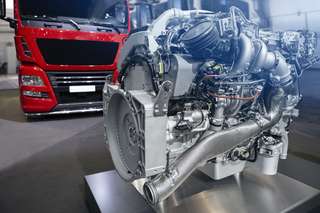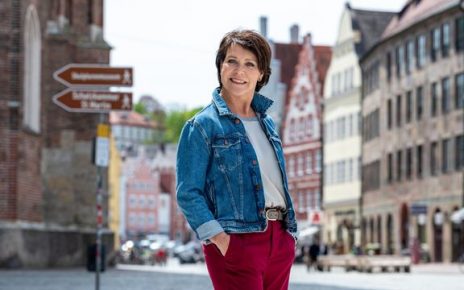 Maria Grant casts her in-person absentee ballot at the Charleston County Public Library on October 30, 2020 in Charleston, South Carolina | Photo by Michael Ciaglo/Getty Images
Maria Grant casts her in-person absentee ballot at the Charleston County Public Library on October 30, 2020 in Charleston, South Carolina | Photo by Michael Ciaglo/Getty Images
“There is this sense that we are other from one another.”
America’s deep polarization has undermined faith that the 2020 election will be free and fair. Republicans are outright accusing Democrats of stealing an election on baseless claims of voter fraud. Democrats, meanwhile, are anxiously gaming out scenarios where the conservative majority on the Supreme Court intercedes to hand the election to Trump.
None of this is a great look for one of the world’s oldest democracies. Which is why the international election monitoring experts at the Carter Center announced this summer they would be taking steps to help strengthen American democracy before, during, and after the 2020 election.
Founded by former President Jimmy Carter in 1982, the organization is best known for working abroad to help strengthen democracies and democratic processes in foreign countries. This includes election monitoring.
The Carter Center isn’t sending election observers to US polling stations in 2020, but their decision to do public outreach around the US election was an acknowledgment that the country was showing troubling signs of democratic backsliding, from its crippling polarization to renewed racial tensions.
To find out more about what prompted the Carter Center to focus its attention on the US and what specifically has its experts so concerned, I called up Avery Davis-Roberts, who manages the Carter Center’s Democratic Election Standards Project.
Our conversation, lightly edited for length and clarity, is below.
Jen Kirby
Most of the Carter Center’s work is abroad, so what prompted the center to get involved in the US election this year?
Avery Davis-Roberts
I think it’s helpful to take a step back and think a little bit about why we’ve gotten involved in elections in other countries, and of the criteria we use when we are looking at those countries, because it puts things in context a little bit.
So often, when we are deciding where we will observe, we look at a number of factors or characteristics about the political environment in the country, and will often prioritize for observation countries that are experiencing extreme political polarization, or where there is an increase in racial tension between the key ethnic groups in the country, or where the country is going through a moment of significant transition, either consolidating democracy or transitioning toward democracy, or maybe taking steps backward and almost backsliding.
There are a lot of different criteria that we use, but those are just a few of them. Most of the time that the Carter Center has been observing, we would not have thought of the United States as meeting those criteria.
But in the last five to 10 years, we’ve seen that political polarization has greatly increased in the US. This year, we were really seeing long-simmering racial tensions come to the surface more in the context of police brutality, and then obviously, the protests and responses to those protests. We’re seeing that there were attacks on our democratic institutions, exacerbated, in part, by the conditions of the pandemic and misinformation.
So this year, we felt that when we consider those characteristics, there would probably be something the Carter Center could bring to support the elections in the United States as we would in other countries.
Jen Kirby
The extreme political polarization, in some respects, isn’t new. Did you see the pandemic and police brutality protests supercharging that — creating a sort of tipping point — or did you have these concerns for some time?
Avery Davis-Roberts
I think you raise a good point. Obviously, the polarization has been happening. We’ve been seeing it happening. I think this year, the pandemic has supercharged everything. So one of the things that’s been a concern of ours is the way that the political polarization in the general environment has been seeping into people’s understanding about the electoral process, and impacting their confidence and trust in elections.
With the pandemic, and the increase in people wanting to vote safely using mail-in ballots, and then all of this misinformation about that process — that’s just one example of the way that we were seeing these narratives around the election potentially decreasing trust, decreasing confidence. And so it was really trying to think about ways that we could bring our international experience to bear to promote trust and confidence that we thought would be useful in this particular election cycle.
Jen Kirby
So what are some of the concrete steps that the Carter Center took to increase trust and faith in the integrity of elections?
Avery Davis-Robert
One of the things we have done is we have embarked on a modest public education campaign, largely social media-based — you know, putting out voter education materials. We’ve done one pre-election video about voting options — why there are multiple options, that there should be an option for everyone, and that they are all safe options.
And post-election, we’ll have a video that talks more about what to expect in the days right after the election and the need to not worry if it takes a while for the votes to be counted.
So we’ve been doing public education through that campaign, but also through a number of online events that we have held for the last month or six weeks. We did some journalist training through Election SOS. We have been working with the National Vote at Home Institute on materials and tools and good practices for election officials.
One of the things that we’ve discovered in our years of working internationally is one way that you can really help promote confidence in the electoral processes is by increasing transparency into that process. So helping the public understand how the process works, but also how they can — if they’re concerned — how they can have access to that process, how journalists can see into that process to help explain what’s happening.
Because if you understand more about what your election officials are doing, then you can understand why processes take a certain amount of time, or what particular issues really mean. So we’ve been working on outreach to election officials to help them think about the simple things that they could do in advance of the election that would help increase transparency.
Jen Kirby
Transparency strikes me as even more challenging in a pandemic — for example, it might be harder for election officials to do outreach with social distancing. How are election officials encouraging transparency with all these challenges?
Avery Davis-Roberts
We’ve put out, with the National Conference of State Legislators, a report on observer practices this year, for pre-election, Election Day, and post-election processes. We did that as part of that reach-out to election officials to find out if they were changing any of their practices around observation because of the pandemic.
In some cases, it seems like there might be fewer people in physical spaces, which is completely understandable. But for the most part, there was definitely an understanding that we need to still maintain that transparency.
Some jurisdictions are trying new things like streaming some of the processes online so that you don’t have to be in an enclosed environment but you can still see what’s happening. So there are jurisdictions that are trying to, you know, do what we’re all doing, which is getting used to Zooming things all the time, and streaming things all the time, to try and promote greater transparency.
And I think this year in particular, election officials are really understanding that there’s a lot of explaining that just needs to be done, particularly around the issue of processing absentee ballots, because we’re seeing such a huge increase in the number of ballots.
That’s just explaining all of the steps that they go through, from beginning to end of that process, to secure the ballots, and how they make sure that voters get the ballots they need, and what happens to your ballot when it’s returned. All of these steps, and sometimes that’s streaming things, sometimes that’s public education campaigns, sometimes it’s giving more interviews to the press. And also just having more resources on their website, so you can track your ballot, you know where it is, and providing information about what to do if there’s an issue.
Jen Kirby
Some of the institutions in the US that are supposed to provide transparency in our elections also seem to be undermined by increased polarization. I’m thinking of something like partisan poll watchers here, who normally oversee elections. But with Trump calling for his supporters to go watch the polls, and the specter of voter fraud, “poll watchers” has taken on a new connotation. It almost seems like these institutions were already really broken, and I wonder how we can fix that?
Avery Davis-Roberts
This idea of party poll watchers is something that we see internationally in almost all countries. There are people who are in the polling places observing the process — not interfering in the process, but observing the process to ensure the best interests of a candidate or a party. That is something that happens internationally. And it happens here.
What I think is unusual in our context is most states allow party poll watchers, but what is much less common are nonpartisan election observers. You would see nonpartisan election observers in many countries around the world.
I think one of the things that has struck me about this process is that we really need to think about ways we can facilitate the role of nonpartisan observers in the election process. To make sure that there are observers who are a part of the process whose job is to help promote the integrity of the process, to help promote transparency in the process, to provide useful feedback to election officials about what’s going really great on Election Day — or before or after the election — but also to provide recommendations on the things that could be a little better next time. So that there’s an objective, nonpartisan way of promoting continuous improvement in the election process itself, and the voters as their main constituents.
Jen Kirby
Almost like an independent election board, or something, that doesn’t have a stake in the outcome of the election.
Avery Davis-Roberts
They would just want the election to be open and, to use the overused term, be “free and fair.” They want the best interests of the voters in that process. So I’ve been thinking about ways that could be more of a common practice across the United States going forward.
Jen Kirby
That makes me wonder whether you think the United States has ceased to be a model of democracy for the rest of the world.
Avery Davis-Roberts
That’s a good question, and I don’t know that I can answer it directly. I think that there have been points in the past where I would be observing elections around the world, and people would say things like, “You’re observing our elections. What about your elections?” Particularly after 2000, when the world was watching people counting votes in Florida. It became a question at that point of, “Oh, you seem to also have issues.”
From our perspective, it’s important to remember that no election is perfect. Anywhere in the world, there is always room for improvement in any election process. It’s important to be humble as we’re embarking on our elections, and to just know that there are some things that we do really well here.
And there are things that they do really well in Zambia, and in Bolivia. There are lessons that can be learned internationally, and we should be humble and be open to continually improving and to try to take what we can as good practices that have worked for others and see if we can incorporate them into our own election process.
Jen Kirby
To that point, the Carter Center isn’t actually sending observers to polls, but there will be international observers from the Organization for Security and Cooperation in Europe (OSCE) and Organization of American States (OAS) this year. What role do international observers play in US elections — or what role could they play?
Avery Davis-Roberts
As international observers would do anywhere, they provide a really important objective outside assessment of how the election process — not just Election Day, but the campaign period, voter registration processes, post-election processes — how all of that has unfolded.
They can provide an objective assessment of that, and put it into the context of international practice, international standards. So it’s always helpful to have somebody who is not maybe so in the weeds on the ins and outs of the day-to-day election experience to provide that outside look at the process.
One of the challenges of observing here is obviously the size of the country and the decentralized nature of our election administration, the fact that there are close to 10,000 electoral jurisdictions in the country. It’s a little bit more of a challenge to observe here — or a lot more of a challenge to observe here — than it might be in a country where even if it’s geographically very large, they have a centralized election administration process. In those countries, recommendations can be made that are quite pointed, because they’re obviously applicable to the whole country.
In the context of the United States, though, some of the recommendations from international observers are a little higher-level, because they have to be — because they can’t make recommendations to Fulton County in Georgia, specifically, when there are thousands of counties across the country.
Jen Kirby
Even with our decentralized system, what would be some signs about the health of American democracy we should be looking for? They may not even be clear on Election Day or even immediately after, but what things are you watching for to signal real or even greater democratic backsliding?
Avery Davis-Roberts
The thing I find most concerning is being hyperbolic. Some of the narratives around democratic backsliding, or the attacks on democratic institutions. It’s important to have those conversations, but I think it’s also important to remember that we do have institutions that function. We do have processes and rules in place to address most of the problems that might come up after Election Day. And that, actually, some of this rhetoric also serves to undermine confidence in the process, and to make people feel like it’s all out of control, and what is the point?
So, you know, trying to find that balance — having concern, but thinking about constructive ways to address that concern, while also understanding that we kind of just have to let the process unfold and see what happens. I think that’s important. I know that’s not directly answering your question, but that is where I’m at.
Jen Kirby
No, I think that makes a lot of sense. But part of that rhetoric does seem to come from this increased polarization, and lack of trust — this idea that the other side is not going to let your vote count. So how do we fix that, or reverse that trend?
Avery Davis-Roberts
There are a host of election reforms that many organizations are working on and that many individual citizens are supporting. I think for me, and one of the things that’s going to be the biggest challenge post-election, no matter what the outcome is, is getting back to this issue of trust. How do we reestablish trust in our election system?
Because someone is going to lose this election, and some people are going to be unhappy about that. But we have to figure out how we can come back to a place where we know that there will be another election. That we know, intellectually and emotionally, that there will be another election and that the people who have been elected were elected, according to whatever rules are in place.
If we don’t like those rules, we have to think about ways to change them. If we think that the electoral system has problems, we have to think about ways that we change those legally.
But rebuilding that trust in the system is important, and rebuilding trust — it sounds kind of kumbaya-ish, but building trust among each other. The fact that supporters on both sides of the political spectrum feel that if the other side wins it’s the end of democracy is a problem. There is this sense that we are other from one another.
And so how do we start mending this sort of societal rift I think is really going to be the challenge. Electoral reforms may be part of that. But there’s a lot of work that we’re going to have to do at the community level to figure out how we can talk to each other.





